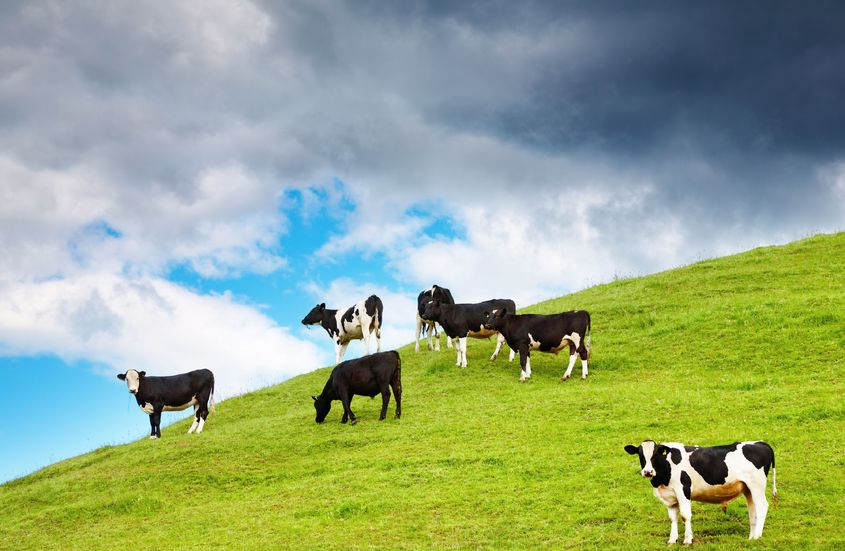
Farmers in Northern Ireland are anxious to work with their counterparts in the Republic to secure deals for exports after Irish agriculture minister Michael Creed said there was 'no upside' for Irish farmers after Brexit.
Mr Creed and Michelle McIlveen, the Northern Irish agriculture minister, have met since the referendum result and Creed said there was 'growing recognition' that there are significant challenges ahead.
"As I have said in the department and in the Government, there really is no upside to Brexit for Ireland.
"The immediate things that are coming into focus is sterling but even where we were last week - we’ve been in that space for five of the last ten years so there is nothing new in that that level of volatility," Creed said.
"But if the value of sterling continued to worsen, we would have to consider whether we would want specific policy instruments to tackle that - that’s an issue for my department in consultation with the Taoiseach’s department and the whole of Government and the Central Bank."
Farmers worry about trade
Prime Minister Theresa May met with Irish leaders and sought to re-assure farmers that no border checks would be put in place.
However, a report compiled by the Northern Ireland Affairs Committee identifies the potential impact of Brexit in key areas such as the economy, agriculture and the border with the Republic.
It said that a post-Brexit deal between the EU and World Trade Organisation would be "hugely damaging" to farmers in NI.
"No one can say for certain what our trade arrangements with the EU would be or how border arrangements with the Republic of Ireland would change, if at all," said Committee Chair Laurence Robertson.
"Nor, of course, do we know what the EU will look like in, say, five or ten years’ time, or what the depth of the UK’s involvement with the EU will be by that time."
Creed said: "The border is a particular difficulty for us - there is so much traffic over and across the border - 350,000 sheep come south for slaughtering every year, there’s about 10,000 pigs a week go north for slaughter and in 2015, 50,000 -plus cattle went over the Border.
"But probably the most complex of all, is we (the Republic) process milk from Northern Ireland in Leckpatrick and Lakeland Dairies in Co Monaghan and that raises questions for us... as I said, when you mix milk from the Queen’s cows with Paddy’s cows - what do you get - Irish butter, Irish milk?"
Professor Michael Curran, an economist at Villanova University in Pennsylvania, said Northern Ireland would be hardest hit post-Brexit.
He told the Irish Examiner: "In terms of agriculture, the Republic of Ireland itself accounts for about 33% of Northern Ireland’s goods exports, and most heavily in terms of agriculture. About 82% of farm income in Northern Ireland comes directly from the EU; from the Common Agricultural Policy (CAP) grants.
"Now, that’s something that’s pretty much going to go as soon as they’ve actually implemented Brexit. So that’s massively going to impact upon the agricultural sector from a Northern Irish perspective."
Exit goals
The Ulster Farmers' Union drew up a list of priorities as the long process of negotiating a replacement for the CAP (Common Agricultural Policy) begins.
UFU president, Barclay Bell, says the outcome of these negotiations will shape the future of agriculture – but he has warned that the process will demand patience.
"There are no quick fix solutions out there. Farmers need to understand that this will be a slow and often frustrating process," said Mr Bell.
"However we have to start with a road map of where we want to go. That is why we believed that it was crucial, even at this early stage, to set out what we consider the priorities are for the negotiations."
Those priorities included maintaining support to farmers equivalent to that presently provided by the EU.
Professor Curran said said non-tariff barriers could raise costs for NI farmers by between 2% and 4% and a recent study by the Centre for Economic Performance (CEP) found that a 2% increase in non-tariff barriers could actually reduce the North's GDP by 1.4% in the long-run. That is if border and custom controls are re-introduced.
"The best-case scenario would be a Norwegian-style deal with access to the European Free Trade Area and membership of the European Economic Area.
"We cannot return to the kind of trade agreements that existed pre-EU membership in 1973 which provided special access for agricultural products. That’s not legally possible anymore because of the EU treaties."
